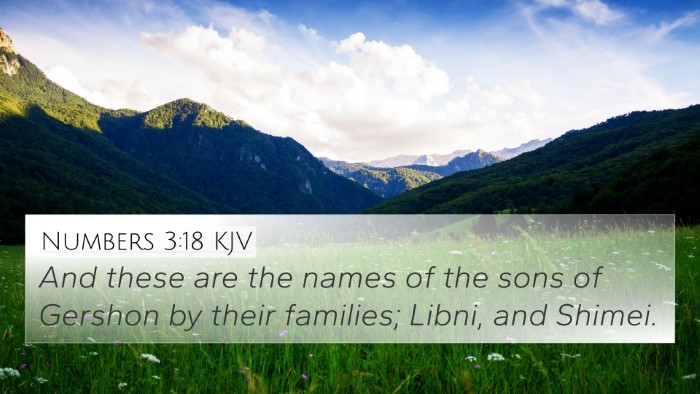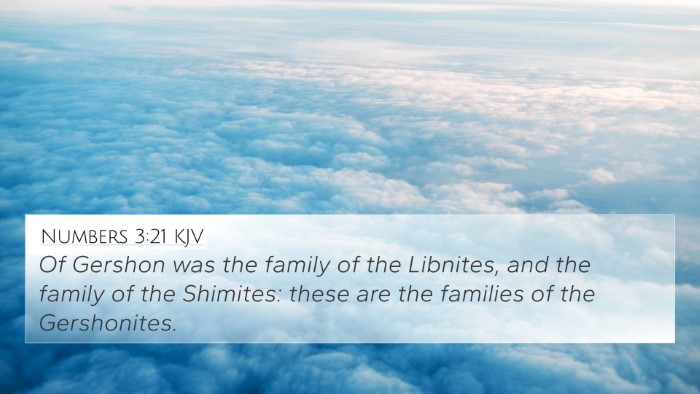Understanding Numbers 4:22
Numbers 4:22 states, "Take a census of the sons of Gershon, by their fathers' houses, by their clans."
This directive given by God to Moses reveals important aspects of organization, structure, and responsibilities within the Israelite community.
Summary of Insights
The census of the Gershonites serves a dual purpose: it emphasizes the significance of each tribe in the grand narrative of Israel's journey and underscores the need for orderly management within the community.
Key Themes
- Divine Order: God establishes a methodical approach to the arrangement of His people.
- Community Structure: Each clan's identity and role are affirmed.
- Responsibility: The Leviathan families, notably the Gershonites, have specific duties within the Tabernacle service.
Bible Verse Cross-References
- Exodus 6:16-17: Highlights the genealogy of the Levites, connecting them to their roles.
- Numbers 1:1-4: The initial census of the people illustrating God’s plan for organization.
- Numbers 3:17-20: Further details on the families of Levi and their expectations.
- 1 Chronicles 23:6-8: This passage reviews the lineage of the Levites, emphasizing the Gershonites' role.
- Psalm 78:67-72: Reflects on God's choice of the tribe of Levi and their responsibilities.
- Hebrews 7:14: Discusses the significance of Jesus' priesthood in relation to the tribe of Levi.
- Acts 6:7: Demonstrates the continuity of service and organization in the early church.
Thematic Bible Verse Connections
The themes of service, responsibility, and divine order seen in Numbers 4:22 can also be identified in various parts of scripture, showing how God values the service of each individual within His community.
Comparative Bible Verse Analysis
Cross-referencing Biblical texts equips believers with deeper insights into how various scriptures relate to one another:
-
Linking Bible Scriptures: By examining Numbers 4:22 alongside Exodus 6:16-17, we see how lineage and duty are interconnected.
-
Bible Verses That Relate to Each Other: The connection between the duties of the Gershonites in Numbers and the responsibilities of the Levites in 1 Chronicles 23 reflects a thematic continuity of service.
-
Bible Cross-Reference Guide: Utilizing tools for Bible cross-referencing brings added clarity and depth.
-
Cross-Referencing Bible Study Methods: Engaging in detailed studies can unveil significant interconnections within different passages.
Practical Application
Understanding Numbers 4:22 can help readers appreciate the importance of their roles within the body of Christ today. Just as the Gershonites had designated tasks, every believer has a purpose and function within the church community.
Conclusion
The verse from Numbers exemplifies how God meticulously organized His people for worship and service. Carrying this motif into modern faith practices can inspire believers to recognize and embrace their divinely appointed responsibilities.





